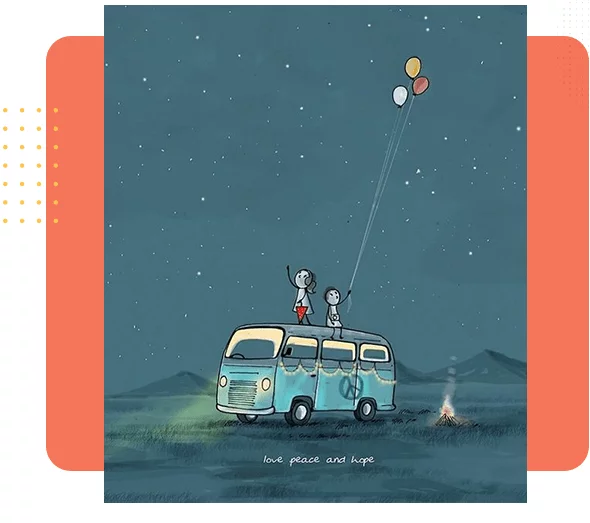War
In February 2022, Russia launched an offensive on Ukraine, resulting in a devastated country. This ongoing conflict is being likened to the atrocities committed during World War II by the Nazis.
Throughout history, humanity has witnessed various forms of war and violence. These include armed conflicts, terrorism, genocide, crimes against minority groups, gender-based violence, and long-standing struggles against discrimination. However, the key to ending such wars lies in pursuing peace through agreements, resolutions, international organizations, and treaties.

Peace
Peace is a state of harmony, tranquility, and absence of violence or conflict among individuals and nations.
Peace has always been a fundamental value advocated by religions such as Buddhism, Baha’i, Daoism, and Islam.
An anecdote from Buddhism tells of an old man saving a scorpion from drowning, despite being stung repeatedly. He explains that it is in the nature of scorpions to sting, but it is in the nature of humans to save and uphold peace. Similarly, Jain monks walk barefoot to avoid harming any living creature, while the word “Islam” itself means submission to God and is derived from the Arabic term for peace.
Ironically, many religious wars throughout history have resulted from misinterpretations of religious texts. However, when we delve into the teachings of various religions, we find common themes of peace and nonviolence. Violence contradicts the essence of love and has no place in any religion. As the Baha’i leader Abdu’l-Bahá stated, let us embrace peace as an experiment, and if its results are unfavorable, we can consider returning to the old ways of war. After centuries of darkness, it is time to move towards the light and embrace unity.
Christianity
“Make every effort to live in peace with everyone and to be holy; without holiness no one will see the Lord.”
—The New Testament (Hebrews 12:14), Christian text
Islam
“On account of [his deed], We decreed to the Children of Israel that if anyone kills a person– unless in retribution for murder or spreading corruption in the land– it is as if he kills all mankind, while if any saves a life it is as if he saves the lives of all mankind.”
—The Qur’an (5:32), Islamic text
Judaism
“Man was created alone in order to teach you that if anyone causes a single soul to perish from Israel, Scripture imputes to him the destruction of the entire world; and if anyone saves alive a single soul in Israel, Scripture imputes to him the saving alive of the entire world. Again, [man was created alone] for the sake of peace among men.”
—Sefer Ha-Aggadah, collection of Jewish writings
Baha’i
“So let us try, as an experiment, peace, and if the results of peace are bad, then we can choose if it would be better to go back to the old state of war! Let us in any case make the experiment. If we see that unity brings Light we shall continue it. For six thousand years we have been walking on the left-hand path; let us walk on the right-hand path now. We have passed many centuries in darkness, let us advance towards the light.”
—‘Abdu’l-Bahá, Baha’i leader
Hinduism
“After a study of those religions to the extent that it was possible for me, I have come to the conclusion that, if it is proper and necessary to discover an underlying unity among all religions, a master-key is needed. That master-key is that of truth and non-violence. When I unlock the chest of a religion with this master-key, I do not find it difficult to discover its likeness with other religions.”
—Gandhi, acknowledged by Indians as Father of the Nation
“Realize the truth of the scriptures; learn to be detached and to take joy in renunciation. Do not get angry or harm any living creature, but be compassionate and gentle; show good will to all.”
—The Bhagavad Gita (16:1-2), Hindu text
Buddhism
“If you have no wound on your hand, you can touch poison without being harmed. No harm comes to those who do no harm. If you harm a pure and innocent person, you harm yourself, as dust thrown against the wind comes back to the thrower.”
—The Dhammapada (124-25), Buddhist text
“Genuine Ahimsa, or non-violence, will only come after the inner disarmament of our mind. Lots of problems in this world are created out of ignorance and greed and it is impossible to achieve nonviolence if our minds are full of fear and hatred. We need to use our human intelligence in challenging and overcoming negative emotions with positive emotions.”
—His Holiness the Dalai Lama

Daoism
“The best are like water
Bringing help to all
Without competing
[…] governing with peace
Working with skill
And moving with time
And because they don’t compete
They aren’t maligned”
—Tao Te Ching, Taoist text
Modern Philosophy
“[Nonviolence] is the truest radicalism, destabilizing to societies built on transaction and domination because it inverts their workings, lays bare their weaknesses, dissolves their core ethic.”
—Ezra Klein, American journalist and co-founder of Vox


